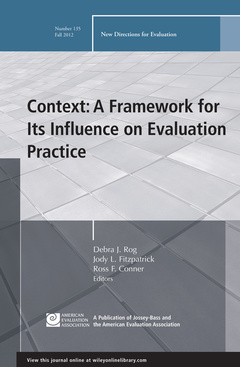Context: A Framework for Its Influence on Evaluation Practice, New Directions for Evaluation, Number 135
Langue : Anglais
Auteur : ROG Debra J.

Context is a force in evaluation. It shapes our practice, influencing how we approach and design our studies, how we carry them out, and how we report our findings. Context also moderates and mediates the outcomes of the programs and policies we evaluate. This issue focuses squarely on the role that ,context plays in practice and illuminates its effect on the implementation and outcomes of programs. Exploring the ways in which attending to context may improve the quality of evaluation practice, the contributions span theory, methods, and practice in an effort to move to a more comprehensive conceptualization of context that can guide our work. It: Provides an historical and theoretical view of evaluators&rsquo, treatment of context Illustrates how context has influenced evaluation practice Presents a five–area framework for guiding a contextual analysis of evaluations , Introduces &ldquo,context assessment,&rdquo, which provides a means of integrating context and its implications within the important stages of evaluation. This is the 135 th volume of the Jossey–Bass quarterly report series New Directions for Evaluation, an official publication of the American Evaluation Association.
EDITORS&rsquo, NOTES 1 Debra J. Rog, Jody L. Fitzpatrick, Ross F. Conner 1. An Introduction to Context and Its Role in Evaluation Practice 7 Jody L. Fitzpatrick This chapter provides an historical and conceptual review of the evaluation literature on context. Particular attention is paid to two areas in which context has been carefully considered by evaluators: the crosscultural or multicultural evaluation and international evaluation. 2. When Background Becomes Foreground: Toward Context–Sensitive Evaluation Practice 25 Debra J. Rog The evaluation field lacks a unified understanding or comprehensive theory of context, and the attention to context in many evaluations is more implicit than explicit. This chapter attempts to bring context from the background to the foreground of our work by offering a framework for guiding context–sensitive evaluation. 3. The Social Context of Water Quality Improvement Evaluation 41 Linda P. Thurston, Christa A. Smith, Kenneth Genskow, Linda Stalker Prokopy, William L. Hargrove This chapter discusses the contextual issues related to evaluating water quality programs, with a focus on the problem and setting contexts of Rog&rsquo,s framework. The authors stress the need for evaluating the social dimensions of watershed projects and highlight an example of a water quality evaluation that addresses regional social indicators. 4. Culture Writes the Script: On the Centrality of Context in Indigenous Evaluation 59 Joan LaFrance, Richard Nichols, Karen E. Kirkhart This chapter describes the indigenous evaluation framework (IEF), a framework that underscores the centrality of context in an indigenous approach. The authors explain the fundamental elements of IEF epistemology and offer several examples of IEF in evaluation in American Indian communities. 5. Political Culture as Context for Evaluation 75 Peter Dahler–Larsen, Thomas A. Schwandt This chapter discusses the relationship of political culture and evaluation, illustrated through two accounts of Danish political culture. The authors use the examples to show that the concept of context is more elusive, more interminable, and less easily managed and accounted for than evaluators often take it to be. 6. A First Step Forward: Context Assessment 89 Ross F. Conner, Jody L. Fitzpatrick, Debra J. Rog Context assessment provides a way to recognize the importance of context and act on it. The authors outline a process of context assessment that takes a first step in making context more explicit and outlines the mix of benefits, limitations, and challenges involved in using the approach. INDEX 107
Date de parution : 09-2012
Disponible chez l'éditeur (délai d'approvisionnement : 12 jours).
Prix indicatif 32,52 €
Ajouter au panier
© 2024 LAVOISIER S.A.S.



